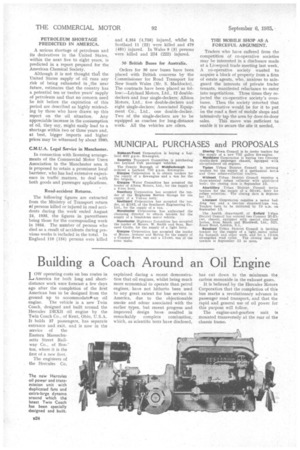PETROLEUM SHORTAGE PREDICTED IN AMERICA.
Page 38

If you've noticed an error in this article please click here to report it so we can fix it.
A serious shortage of petroleum and its derivatives in the United States, within the next five to eight years, is predicted in a report prepared for the American Chemical Society. Although it is not thought that the United States supply of oil runs any risk of being exhausted in ,the near future, estimates that the country has a potential ten or twelve years' supply of petroleum and that no concern need be felt before the expiration of this period are described as highly misleading by those who have drawn up this report on the oil situation. Any appreciable increase in the consumption of oil, they say, might easily lead to a shortage within two or three years and, at best, bigger imports and higher prices may be witnessed by about 1940.
C.M.U.A. Legal Service in Manchester.
In connection with licensing arrangements of the Commercial Motor Users Association in the Manchester area it is proposed to retain a prominent local barrister, who has had extensive experience in traffic matters, to deal with both goods and passenger applications.
Road-accident Returns.
The following figures are extracted from the Ministry of Transport return if persons killed or injured in road accidents during the week ended August 24, 1935, the figures in parentheses being those for the corresponding week in 1934. The number of persons who died as a result of accidents during pre' vious weeks is included in the total. In England 110 (134) persons were killed and 4,354 (4,756) injured, whilst in Scotland 11 (22) were killed and 479 (481) injured. In Wales 9 (3) persons were killed and 234 (222) injured.
30 British Buses for Australia.
Orders for 30 new buses have been placed with British concerns by the Commissioner for Road Transport for New South Wales (Mr. S. Maddocks). The contracts have been placed as follow:—Leyland Motors. Ltd., 12 doubledeckers and four single-deckers; Albion Motors, Ltd., five double-deckers and eight single-deckers; Associated Equipment Co., Ltd., one double-decker. Two of the single-deckers are to be equipped as coaches for long-distance work. All the vehicles are oilers.
THE MOBILE SHOP AS, A FORCEFUL ARGUMENT.
Traders who have suffered from the competition of co-operative societies may be interested in a disclosure made at a Liverpool trade meeting last week. A co-operative society wanted to acquire a block of property from a firm of estate agents, who, anxious to safeguard the interests of private trader tenants, manifested reluctance to enter into negotiations. Three times they rejected the co-operative society's overtures. Then the society retorted that the alternative would be for it to put
• On the road a fleet of mobile shops and intensively tap the area by door-to-door sales. This move was sufficient to enable it to secure the site it needed.




























































































